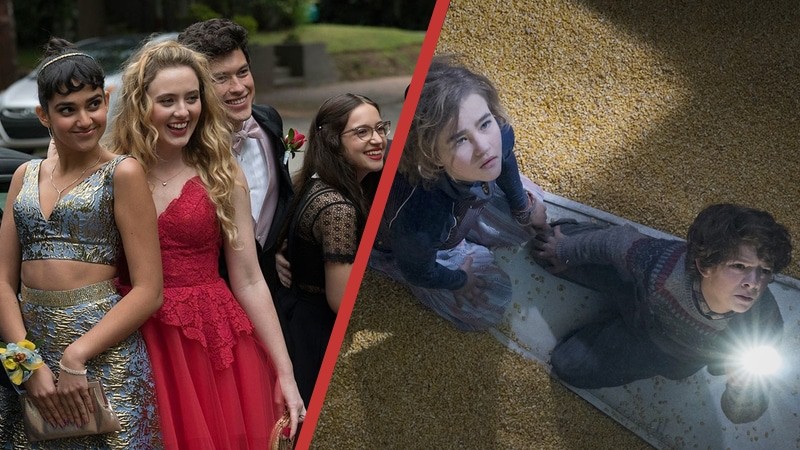
This weekend at the multiplex, two genres films show what happens when Generation Z starts taking matters into its own hands.
If you’ve got something important to say, say it in a genre film. Fans of comedy and horror already know that their films can often outpace more traditional Hollywood fare in terms of delivering progressive messages. That is certainly the case this weekend, where two movies – A Quiet Place and Blockers – hide a not-so-subtle message about generational empowerment amidst their screams and screams of laughter. And while neither studio could have expected it, both films are being delivered at a time where America seems ready to embrace the subtext of both movies.
For weeks now, the biggest story on every network has been the efforts of the Marjory Stoneman Douglas High School students to promote safer gun laws in America. David Hogg and Emma Gonzalez have become voices of generational change, and the discussion surrounding their politics has ranged from the thought-provoking (“Why Parkland Students Have Emerged As a Powerful Political Voice,” Washington Post) to the, um, openly controversial (“If Anyone Is The Bully In The Laura Ingraham Spat, It’s David Hogg,” The Federalist). For those aligned with the Parkland teenagers’ messages, it’s hard not to view this is a moment of true change, where a younger generation decided to stop waiting and take care of things themselves.
And whether intentional or otherwise, this is the climate into which both A Quiet Place and Blockers will be released. Neither film has an overt political agenda; the former is a clever spin on traditional studio horror films, the latter a prototypical Apatow sex comedy. But hiding behind each film’s genre facade is a deeper movie about torches between passed between generations. In both A Quiet Place and Blockers, it is the film’s young women who possess the skills needed to navigate their changing world, while the adults are the ones left struggling on the sidelines. At a time where Generation Z is taking an active ownership in its own future, both films have something to say about the persistence of youth (and the failure of previous generations too fixed in their ways to see the horizon).
While audiences will flock to A Quiet Place for the promise of silence and scares in equal measure, one of the most important parts of the film is the central relationship between father and daughter. John Krasinksi’s Lee has struggled to connect with his deaf daughter Regan (Millicent Simmonds) after the death of their youngest son, but the tension between the two runs much deeper than that. As much as he may love his daughter, Regan’s inability to hear makes her a liability in Lee’s eyes. Rather than teach Regan what she needs to know to survive, Lee holds back, refusing to let her participate in his long-term research and planning. Part ableism, part hell path of good intentions, this disconnect between the two is paid off in the film’s finale when it is Regan’s deafness that allows the family to survive. As such, much of the violence in A Quiet Place would have been thwarted if Regan had been given a say in her own future.
Blockers also paints an unflattering picture of its adults’ need to control the lives of their children. While the film is ostensibly focused on the adult relationships between the parents – Leslie Mann, John Cena, and Ike Barinholtz, each playing a trumped up version of the onscreen personalities that made them famous – it is the film’s younger stars who shine. Each of the daughters confronts sex on their own terms, and each struggles with the double standard of being a sexually active teenage girl. There is both logic and emotional intelligence behind their infamous sex pact; they are each ready for the transition to adulthood, even as their parents run themselves ragged trying to exert control over their daughters one last time.
Given these thematic elements, it’s not a coincidence that both movies end with a parent relinquishing their position of power. In A Quiet Place, for example, Krasinski’s characters calls out to one of the creatures, luring it away from his trapped daughter and putting the survival of the family solidly into her hands. In Blockers, each parent has their own epiphany, no more so than Cena’s Mitchell, who admits to Geraldine Viswanathan’s Kayla that he has no idea why his daughter engaging in consensual sexual activity causes him such angst. In both situations, a parent is made to suffer for not letting their daughter pursue their own path, and A Quiet Place and Blockers are very clear as to who ends up on the relationship high-ground.
In an ideal world, both movies will do well at the box office this weekend – they’re both above-average to good films and standouts within their own genres – and pave the way for more movies that take a clear stance on the failings and frustrations of parents. But if we’ve learned anything from movies like A Quiet Place and Blockers, it’s this: not only are they already here, but they’re already a force to be reckoned with. You should enjoy knowing that in multiplexes around the country this weekend, people will be confronted with a message of transition and empowerment. It may not be overtly political, but something tells me it’ll be heard just as loud and clear.
Related Topics: A Quiet Place, Blockers, Comedy, Horror

